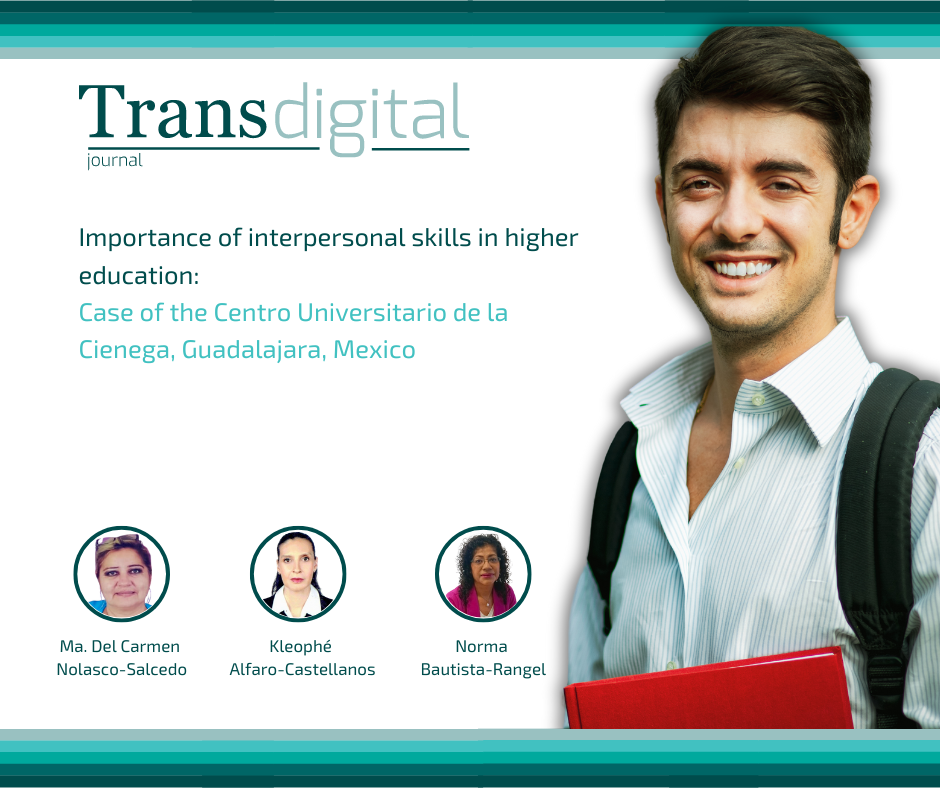Importance of interpersonal skills in higher education
Case of the Centro Universitario de la Cienega, Guadalajara, México
DOI:
https://doi.org/10.56162/transdigital335Keywords:
transversal skills, universal competencies, education, studentsAbstract
Interpersonal skills play an important role for learning, social interactions, and job searching. Entrepreneurs seek for people who have these skills to participate within their companies. The research analyzed students' perception of the importance of interpersonal skills during their university career. To collect data, a questionnaire was applied to 133 students belonging to the Centro Universitario de la Cienega, Guadalajara, México. Most respondents feel that interpersonal skills are useful for social interaction, but do not consider that they contribute to their academic performance. It was identified that teamwork, decision making, problem solving, time management and critical thinking skills were perceived as the most important skills for students. This article suggests strategies to improve students' social skills to improve their job prospects.
References
Caceres, E. (2023). TDN | Daniel Goleman. “El remedio universal es la compasión”. Página web oficial de la Asociación de Fabricantes y Distribuidores. https://www.aecoc.es/articulos/tdn-daniel-goleman-el-remedio-universal-es-la-compasion/
Chandhok, S. (2021). Roles of Soft Skills in Employability and Professional Advancement: An Analytical Study. International Transaction Journal of Engineering, Management, & Applied Sciences & Technologies, 12(7), 1-10.
Hernández Herrera, C. A., & Neri Torres, J. C. (2020). Las habilidades blandas en estudiantes de ingeniería de tres instituciones públicas de educación superior. RIDE Revista Iberoamericana para la Investigación y el Desarrollo Educativo, 10(20). https://doi.org/10.23913/ride.v10i20.678
Hernández, G. (2021). Habilidades blandas incrementan hasta en 16% los ingresos de los trabajadores. El Economista. https://www.eleconomista.com.mx/capitalhumano/Habilidades-blandas-incrementan-hasta-en-16-los-ingresosde-los-trabajadores-20211208-0120.html
Hodges, D., & Burchell, N. (2003). Business graduate competencies: Employers' views on importance and performance. Asia-Pacific Journal of Cooperative Education, 4(2), 16-22.
Mangrulkar, L., Whitman, C. V., & Posner, M. (2001). Enfoque de habilidades para la vida para un desarrollo saludable de niños y adolescentes. Organización Panamericana de Salud. https://convivencia.files.wordpress.com/2008/11/habilidades2001oms65p.pdf
Marrero Sánchez, O., Mohamed Amar, R., & Xifra Triadú, J. (2018). Habilidades blandas: necesarias para la formación integral del estudiante universitario. Revista Científica Ecociencia, 5, 1–18. https://doi.org/10.21855/ecociencia.50.144
Matherly, C.A., & Tillman, M.J. (2015). Higher Education and the Employability Agenda. En J. Huisman, H. Boer, D.D. Dill y M. Souto-Otero (Eds.), The Palgrave International Handbook of Higher Education Policy and Governance (pp. 281-299). Palgrave Macmillan.
Morgan, K. (2022). 'Soft skills': The intangible qualities companies crave. BBC. https://www.bbc.com/worklife/article/20220727-soft-skills-the-intangible-qualities-companies-crave
Osmani, M., Weerakkody, V., Hindi, N. M., Al?Esmail, R., Eldabi, T., Kapoor, K., & Irani, Z. (2015). Identifying the trends and impact of graduate attributes on employability: a literature review. Tertiary Education and Management, 21(4), 367–379.
Sosa, R. (2019). Aprender Soft Skills, las habilidades del futuro. Forbes México. https://www.forbes.com.mx/aprender-soft-skills-las-habilidades-del-futuro/
Tran, L. H. N. (2017). Developing employability skills via extra-curricular activities in Jordanese universities: student engagement and inhibitors of their engagement. Journal of Education and e-Learning Research, 30(8), 854-867.

Downloads
Autor de correspondencia
El autor de correspodencia se identifica con el siguiente símbolo: *Published
How to Cite
License
Copyright (c) 2024 Ma. Del Carmen Nolasco-Salcedo, Kleophé Alfaro-Castellanos, Norma Bautista-Ranagel

This work is licensed under a Creative Commons Attribution 4.0 International License.
All articles in Transdigital are licensed under a Creative Commons Attribution 4.0 International License. Authors hold the copyright and retain publishing rights without restrictions.









